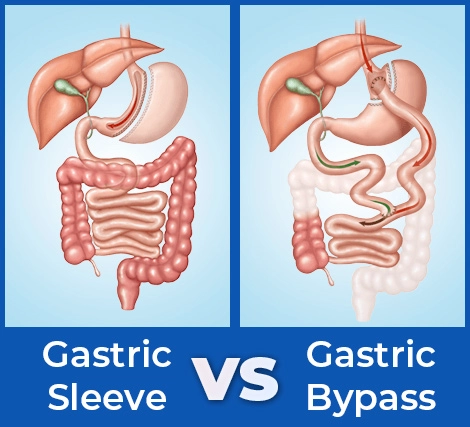


Obesity is a leading health problem in the world, resulting in several health complications like diabetes, heart disease, and blood pressure. Weight loss surgery is a viable option for people who tried conventional weight loss practices but with no success. Gastric sleeve and gastric bypass are two of the most common weight loss surgeries. Through this article, we will discuss the differences and advantages of both surgeries.

Gastric sleeve surgery, or sleeve gastrectomy, is a weight loss surgery that removes a section of the stomach to create a new smaller stomach pouch. The stomach left behind has the shape of a sleeve or a tube and is thus called gastric sleeve. With the smaller stomach capacity, patients feel full on smaller food portions and, accordingly, lose weight.

Gastric bypass surgery, or Roux-en-Y gastric bypass, is a type of weight loss surgery in which a small pouch is made in the stomach and the digestive tract is bypassed. The upper portion of the stomach is stapled to form a smaller pouch, which is then linked directly to the small intestine, bypassing the rest of the stomach and the lower portion of the small intestine. The reduced stomach capacity and rearranged digestive system result in fullness and lower absorption of calories and nutrients, which leads to weight loss.

The primary difference between gastric sleeve and gastric bypass is how the stomach is reduced in size. Gastric sleeve surgery involves removing a portion of the stomach to create a smaller stomach pouch, while gastric bypass surgery involves stapling the upper part of the stomach to create a smaller pouch and rerouting the digestive tract.
Gastric bypass surgery involves bypassing a portion of the small intestine, leading to reduced absorption of calories and nutrients. This can lead to a higher risk of vitamin and mineral deficiencies, which requires ongoing monitoring and supplementation. In contrast, gastric sleeve surgery does not alter the digestive tract, and there is less risk of nutrient deficiencies.
Both gastric bypass and gastric sleeve procedures are associated with considerable weight loss. Gastric bypass, however, tends to produce more weight loss during the initial year of the operation compared to gastric sleeve surgery, which results in gradual but consistent weight reduction over several years.
Weight loss surgery can improve various health conditions related to obesity, such as diabetes, high blood pressure, and sleep apnea.
Gastric sleeve and gastric bypass surgeries lead to sustained weight loss, resulting in improved quality of life and reduced risk of obesity-related health complications.
Weight loss surgery can improve self-confidence and self-esteem, leading to a better quality of life.
Gastric sleeve is compared to gastric sleeve and gastric bypass surgeries, which are effective weight-reduction procedures for patients who have not been successful using conventional weight-reduction strategies. Although they share some similarities, like extreme weight reduction and better health results, they also differ in stomach shrinking and nutrient deficiency potential. Referral to a professional healthcare provider is critical in determining which procedure should be used for each case.